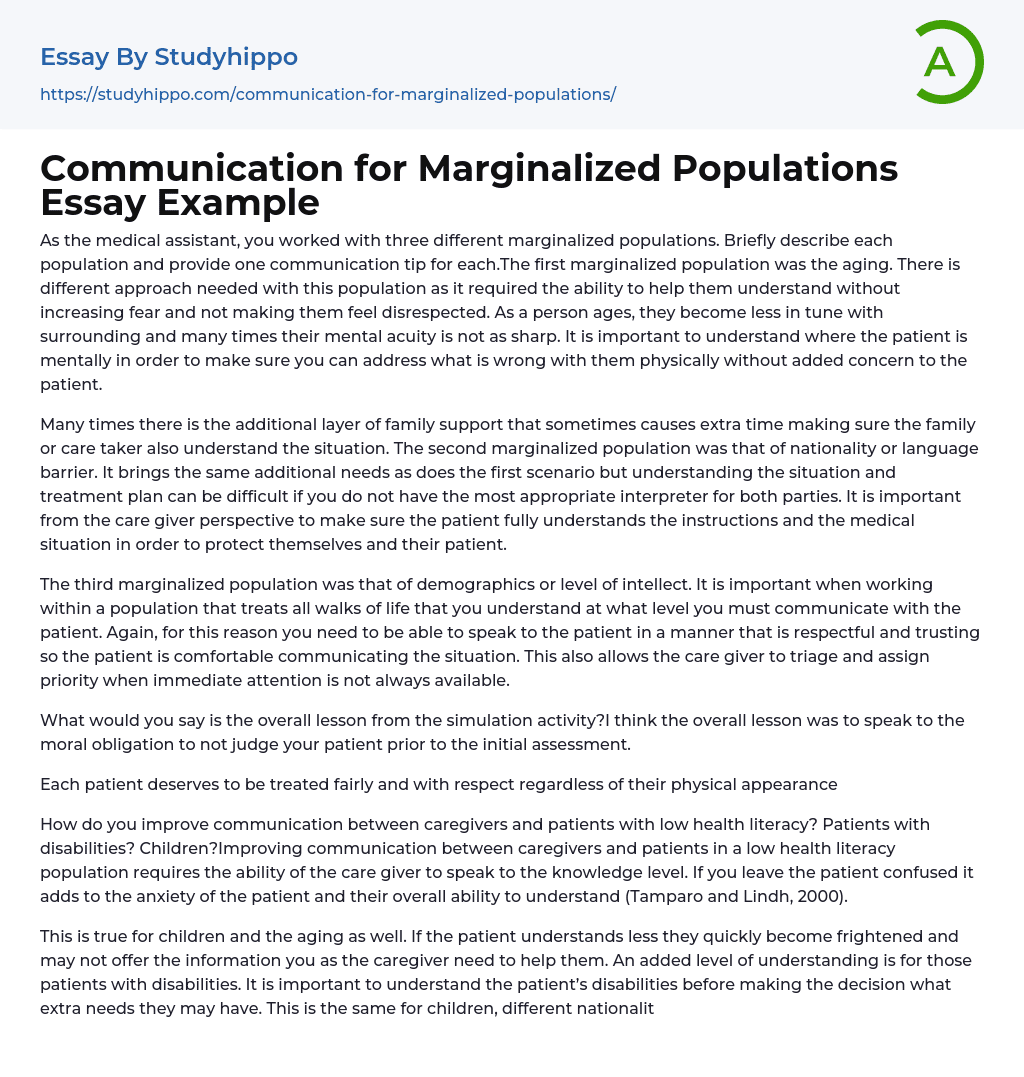As the medical assistant, you worked with three different marginalized populations. Briefly describe each population and provide one communication tip for each.The first marginalized population was the aging. There is different approach needed with this population as it required the ability to help them understand without increasing fear and not making them feel disrespected. As a person ages, they become less in tune with surrounding and many times their mental acuity is not as sharp. It is important to understand where the patient is mentally in order to make sure you can address what is wrong with them physically without added concern to the patient.
Many times there is the additional layer of family support that sometimes causes extra time making sure the family or care taker also understand the situation. The second marginalized population w
...as that of nationality or language barrier. It brings the same additional needs as does the first scenario but understanding the situation and treatment plan can be difficult if you do not have the most appropriate interpreter for both parties. It is important from the care giver perspective to make sure the patient fully understands the instructions and the medical situation in order to protect themselves and their patient.
The third marginalized population was that of demographics or level of intellect. It is important when working within a population that treats all walks of life that you understand at what level you must communicate with the patient. Again, for this reason you need to be able to speak to the patient in a manner that is respectful and trusting so the patient is comfortable communicating the situation. This also allows the care
giver to triage and assign priority when immediate attention is not always available.
What would you say is the overall lesson from the simulation activity?I think the overall lesson was to speak to the moral obligation to not judge your patient prior to the initial assessment.
Each patient deserves to be treated fairly and with respect regardless of their physical appearance
How do you improve communication between caregivers and patients with low health literacy? Patients with disabilities? Children?Improving communication between caregivers and patients in a low health literacy population requires the ability of the care giver to speak to the knowledge level. If you leave the patient confused it adds to the anxiety of the patient and their overall ability to understand (Tamparo and Lindh, 2000).
This is true for children and the aging as well. If the patient understands less they quickly become frightened and may not offer the information you as the caregiver need to help them. An added level of understanding is for those patients with disabilities. It is important to understand the patient’s disabilities before making the decision what extra needs they may have. This is the same for children, different nationalities, and the aging.
Being kind, respectful, and attentive to your patient will always result in better and positive communication. That is true for all aspects of life, not just the health care profession.
- Greeting essays
- Orality essays
- Intercultural Communication essays
- Interpersonal Communication essays
- Cross-Cultural Communication essays
- Nonverbal Communication essays
- Effective Communication essays
- Communication Skills essays
- Hospital essays
- Physician essays
- Health Care Provider essays
- Universal Health Care essays
- Readmission essays
- Caregiver essays
- Arranged Marriage essays
- Communication essays
- Conflict Management essays
- Conflict Resolution essays
- Connection essays
- Conversation essays
- Dating essays
- Friendship essays
- Mediation essays
- Addiction essays
- Anatomy and Physiology essays
- Biodegradation essays
- Cancer essays
- Dental Care essays
- Disability essays
- Disease essays
- Disorders essays
- Health Care essays
- Infectious Disease essays
- Inquiry essays
- Intelligence Quotient essays
- Lung Cancer essays
- Medicine essays
- Neurology essays
- Nutrition essays
- Olfaction essays
- Physical Exercise essays
- Public Health essays
- Sex essays
- Women's Health essays
- World health organization essays
- Cultural Assimilation essays
- Demography essays
- Ethnographic essays
- Population essays
- Population Growth essays




